|
|
|
Sort Order |
|
|
|
Items / Page
|
|
|
|
|
|
|
| Srl | Item |
| 1 |
ID:
140932
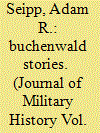

|
|
|
|
|
| Summary/Abstract |
This article examines a large body of written and oral testimonies by American servicemen who witnessed the liberation of the Buchenwald concentration camp in April 1945. During the decades since, the experience of liberation has become a central component of American public memory of World War II in Europe. As this article demonstrates, liberator testimony has shifted in important ways during the subsequent decades, both reflecting and shaping changes in American engagement with both the war and the Holocaust.
|
|
|
|
|
|
|
|
|
|
|
|
|
|
|
|
| 2 |
ID:
095686
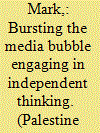

|
|
|
| 3 |
ID:
110474
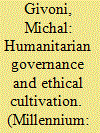

|
|
|
|
|
| Publication |
2011.
|
| Summary/Abstract |
This article seeks to analyse contemporary humanitarianism as an advanced-liberal formation of global governance. It tracks the emergence in the 1970s of the French humanitarian organisation Médecins sans Frontières and shows that its care for and control of distant victims has been commingled with and dependent upon care for Western selves. The article contends that humanitarianism 'without borders' was the outgrowth of the legitimacy crisis of the medical profession, and that its practice of witnessing has ultimately been a mode of ethical self-cultivation by means of which physicians could fashion themselves as more enlightened personae. It further shows that the recent concern with the detrimental side effects of humanitarian action should be deciphered as the culmination of the practices of the self in which global humanitarianism has been embedded since the 1970s.
|
|
|
|
|
|
|
|
|
|
|
|
|
|
|
|
| 4 |
ID:
117926
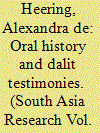

|
|
|
|
|
| Publication |
2013.
|
| Summary/Abstract |
The development of dalit literature and history plays a vital part in the effort of dalit communities to (re)gain recognition in Indian society. Victims of multiform discrimination in the name of caste, dalits have used these areas of self-knowledge to assert themselves culturally and socially. Indian society and mainstream intellectuals continue, however, to deny the value and legitimacy of dalit historical and literary productions. There is a tendency to believe that dalits should be kept out of the mainstream and effectively silenced. Therefore, testifying through writings or oral narratives still requires courage and determination. It certainly seems to be a demanding ordeal for those paving the way for dalit expression. This article, based on oral history fieldwork conducted among dalit (Cakkiliyar) communities in Tamil Nadu, as well as on written testimonies, highlights factors preventing dalits from exercising freedom of speech and also discusses some reasons why dalits do decide to speak.
|
|
|
|
|
|
|
|
|
|
|
|
|
|
|
|
| 5 |
ID:
192924
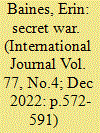

|
|
|
|
|
| Summary/Abstract |
Breaking the silence around wartime sexual violence is often understood as paramount to ending it. Many survivors feel compelled to publicly testify to prevent future harms, contest denial, and hold perpetrators to account. Yet, testimony is not always spoken, and silence should not be elided with powerlessness. In this article, we conceptualize the space in-between silence and voice as a form of multi-modal testimony that is given to protect, sustain, and reimagine relationships. We consider this in relation to the efforts of Adok, a woman abducted and forced into marriage by a rebel group in northern Uganda. Following her escape and return home with two children, Adok faced what is described as the “secret war”: ongoing structural and lateral violence. Her efforts to hold the father of her children to account attests to the “secret war,” and calls for a collective response to protect the future of her children.
|
|
|
|
|
|
|
|
|
|
|
|
|
|
|
|
| 6 |
ID:
169993
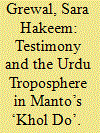

|
|
|
|
|
| Summary/Abstract |
While scholars of Partition frequently reference witnessing as a necessary frame for understanding Partition literature, and particularly the work of Saadat Hasan Manto, I analyse Manto’s short story ‘Khol Do’ (‘Open It’) to argue that the text’s use of Urdu-inflected tropology both deploys and exceeds the discourse of testimony. Through its turn toward magical realism in its devastating ending, ‘Khol Do’ demonstrates both the futility of attempting to definitively fix meaning in the context of unrelenting ambiguity, as well as the vital necessity of Urdu literature in constructing new communities of reading and interpretation in the wake of the ruptures of Partition.
|
|
|
|
|
|
|
|
|
|
|
|
|
|
|
|
| 7 |
ID:
099069
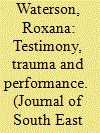

|
|
|
|
|
| Publication |
2010.
|
| Summary/Abstract |
This paper is a reflection on a number of theatre performances held in Singapore, each of which probed problematic or traumatic historical events occurring either in Singapore itself or in other parts of Southeast Asia. These avant-garde performances were inspired by or built around actual testimonies of individuals in ways which, for this author, suggest a striking fluidity in the boundaries between testimony and performance, one that raises difficult questions about performance ethics and the processes by which collective memories are shaped. The plays also made use of visual media: one had been recorded on video while others incorporated photographic and video materials into the actual performance. At the time I witnessed these plays, I had already become interested in the way that, over the course of the twentieth century, documentary films had come to play an increasingly important role in the recording of testimony concerning traumatic events. Testimony on film, I have argued, functions simultaneously as evidential trace, and as performative event. Films of testimony develop their own trajectories as they enter into the realms of public remembering. They preserve and extend the record of personal experiences, thereby adding them to the pool of collective memory about an event. Theatrical performances, too, develop their own trajectories through repetition, as Marvin Carlson's statement (cited above) suggests. But what exactly might be different when testimony is performed as drama before a live audience? What are the purposes of such performances, and what might be their possible effects upon both participants and audiences? Is the trace left by a live theatre performance inevitably more ephemeral than those captured on film, or might it be in some respects even more powerful? These are some of the questions I raise - without necessarily being able to present definitive answers - in what follows. I conclude by arguing that in the Singapore context, because censorship laws place very specific constraints on the making of documentary films with openly political content, in recent years theatre has been able to offer a slightly greater space than film as a medium for critical reflection. How theatre directors and actors have tried to use this space is a subject correspondingly deserving of our close attention.
|
|
|
|
|
|
|
|
|
|
|
|
|
|
|
|
| 8 |
ID:
166893
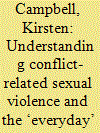

|
|
|
|
|
| Summary/Abstract |
The testimonies of witnesses who testify before criminal courts provide crucial insights into the situated experience of conflict-related sexual violence. Witness testimonies highlight the complex realities and everyday lives of individuals caught up in situations of armed conflict. The evidence presented by witnesses can provide vital insights into lived experiences of wartime violence, and reveal the seemingly mundane strategies and tactics adopted by victims to cope with, survive and resist the violent and coercive circumstances of war. This article foregrounds conflict-related sexual violence witness testimonies as highly significant sources of knowledge of everyday experiences of conflict. It sets out a bottom-up, mixed-method approach for identifying and analysing the experiential accounts of those who lived through conflict-related sexual violence, while engaging with the opportunities and challenges of using witness testimony. Our approach unsettles existing notions of ‘the everyday’ in Peace & Conflict Studies as a synonym for narratives and practices of violence, justice and peacebuilding that are private, informal and largely hidden from view. Understanding witness testimonies requires conceptualising the everyday as an amalgam of formal and informal practices, as accessible through both elite and lay knowledges and as documented in both public and private (e.g. redacted) sources. It requires challenging taken-for-granted dichotomies that are frequently invoked to understand conflict and peace.
|
|
|
|
|
|
|
|
|
|
|
|
|
|
|
|
|
|
|
|
|